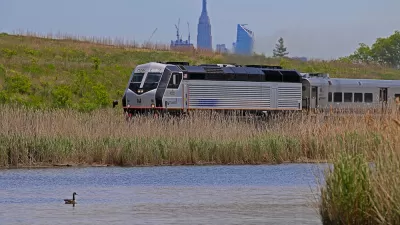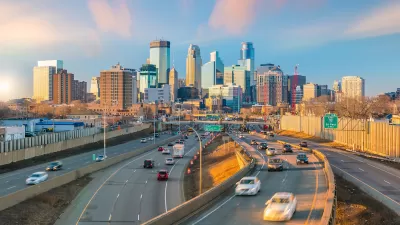The conventional planning wisdom seems to be that long drives are less beneficial to well-being than a short walk. But what about other commuting options?

Last week, I saw something on Twitter I had already seen several times: a link to studies suggesting that people are happier when they can walk to work than when they spend a long time driving to work. This claim strikes me as only slightly less obvious than the claim that water is wet. But at the same time, it raises more questions than it answers. For example:
*Is commuting-related unhappiness limited to driving, or is the long-distance commuter equally dissatisfied whether she bikes, drives, takes a bus, or takes a train? Or to put it another way, does the sheer length of commuting reduce well-being, or is mode choice also an important factor? For example, if a commuter's choice is between a 20 minute drive and a 40 minute subway ride, which is more demoralizing? One British study suggests drivers are as happy or happier than transit users when commuting time is equal; another study disagrees.
*The "short walk/long drive" dichotomy presupposes that work is in a downtown or other walkable neighborhood, while the long drive is from the outer edges of suburbia. But most Americans (including me) work in suburbs. If a commuter's job is in a suburban office park, is he happier living close to the office park, or should he prefer a long ride from a more walkable neighborhood?
*Given that, other things being equal, a short walk is better than a long drive, how should a commuter weigh that factor against other factors? For example, the rent for my current apartment in Manhattan is comparable to the rent for a two-bedroom apartment in Queens, or a three-bedroom house in Suffolk County. As a single person, the extra space is useless to me. But if I had a spouse and a child or two, would the benefits of the extra space outweigh whatever unhappiness I suffered from my commute?
I don't know the answers to any of these questions; I only claim that further research is worthwhile.

Planetizen Federal Action Tracker
A weekly monitor of how Trump’s orders and actions are impacting planners and planning in America.

San Francisco's School District Spent $105M To Build Affordable Housing for Teachers — And That's Just the Beginning
SFUSD joins a growing list of school districts using their land holdings to address housing affordability challenges faced by their own employees.

The Tiny, Adorable $7,000 Car Turning Japan Onto EVs
The single seat Mibot charges from a regular plug as quickly as an iPad, and is about half the price of an average EV.

Seattle's Plan for Adopting Driverless Cars
Equity, safety, accessibility and affordability are front of mind as the city prepares for robotaxis and other autonomous vehicles.

As Trump Phases Out FEMA, Is It Time to Flee the Floodplains?
With less federal funding available for disaster relief efforts, the need to relocate at-risk communities is more urgent than ever.

With Protected Lanes, 460% More People Commute by Bike
For those needing more ammo, more data proving what we already knew is here.
Urban Design for Planners 1: Software Tools
This six-course series explores essential urban design concepts using open source software and equips planners with the tools they need to participate fully in the urban design process.
Planning for Universal Design
Learn the tools for implementing Universal Design in planning regulations.
Smith Gee Studio
City of Charlotte
City of Camden Redevelopment Agency
City of Astoria
Transportation Research & Education Center (TREC) at Portland State University
US High Speed Rail Association
City of Camden Redevelopment Agency
Municipality of Princeton (NJ)






























